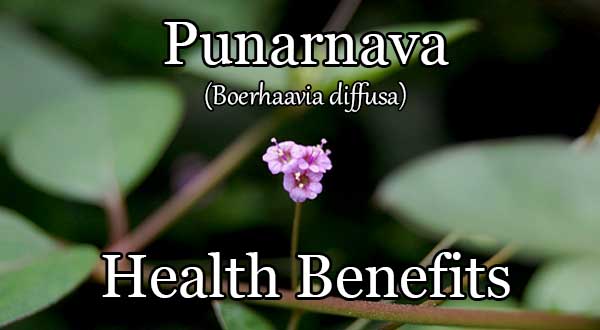I like to forage for wild edibles and medicinal plants, but admittedly can’t identify too many. Boerhaavia diffusa is one plant which I repeatedly saw around the United States. It wasn’t until I took a trip to India that I finally learned what the plant is.
While there are many amazing plants with medicinal properties, punarnava is one of the best yet underutilized. Not only does punarnava have lots of benefits, but it is one of the cheapest superfoods and easy to produce. Here’s what you need to know about the plant and why to use it.
What is Punarnava?
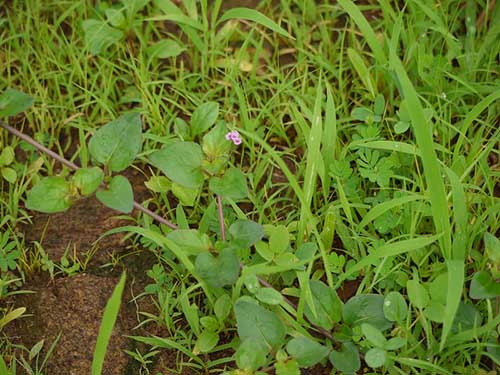
Punarnava is a plant which is commonly used in Ayurveda medicine as well as many other ancient and folk medicines. It grows in many tropical and subtropical areas around the world including India, Nigeria, and the United States.
The plant grows close to the ground and spreads out. Punarnava somewhat resembles purslane (a common edible). The main difference is that Punarnava has tiny sticky fruits. The fruits stick to animals as they pass by to spread the seeds. It’s a very hardy plant and you’ll sometimes see it growing out of sidewalk cracks.
Other Names for Punarnava
Punarnava is the Sanskrit name for the plant. It means “rejuvenates the body” in Ayurveda medicine. In English, punarnava is usually called by its Latin name, Boerhaavia diffusa.
It is also sometimes called red spiderling or tar vine in English. Sometimes it’s also called spreading hogweed, even though hogweed is a different plant (common hogweed is delicious and has seeds which taste like cardamom). I’ve also heard punarnava called pigweed before, but that is just a generic term for any plant that which could be used for pig fodder.
Here is a list of names for punarnava, including some of the many local Indian names. Because punarnava grows in so many countries, there are dozens of other local names too.
- Boerhaavia diffusa(Latin)
- Sothaghni (Sanskrit)
- Varshabhu (Sanskrit)
- Dholia-saturdo (Gujarati)
- Snathikari (Hindi)
- Kommegida (Kannada)
- Tambadivasu (Marathi)
- Punurnava (Bengali)
- Mukaratee-Kirei (Tamil)
- Punernava (Telugu)
- Horse purslane (English)
- Pega-pinto (Brazilian)
- Huang xi xin (Chinese)
Where to Buy Punarnava
Punarnava grows easily in many parts of the world. Unfortunately though, not all punarnava has the same nutritional and health value. When grown in poor conditions, the resulting punarnava plant can be very poor quality.
Ideally, you would forage or grow your own punarnava plants. If that is not possible, then try to choose an organic punarnava product as it’s more likely that quality soil and good farming practices were used. (1)
Below are some of the best punarnava powders and supplements you can buy online.
Banyan Botanicals Punarnava Powder
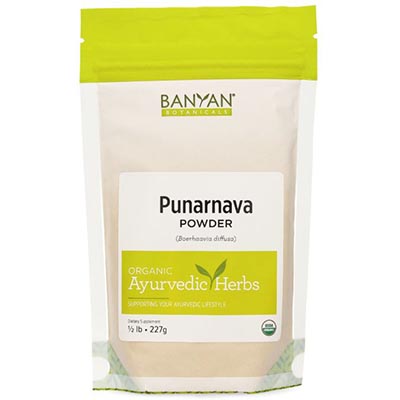 Banyan Botanicals is brand which makes quality Ayurveda supplements, almost all of which are organic, sustainably sourced and fairly traded. Their punarava powder is high quality yet very affordable.
Banyan Botanicals is brand which makes quality Ayurveda supplements, almost all of which are organic, sustainably sourced and fairly traded. Their punarava powder is high quality yet very affordable.
Organic Punarnava Root Powder


Indiveda is a small Indian company which makes natural supplements. Their punarnava powder is certified organic. I also like that it is packaged in a sealed air-tight package so the powder doesn’t degrade due to oxidation.
Planet Ayurveda Punarnava Mandur
This supplement is contains 11 different ingredients which are based on an Ayurveda formula. Punarnava is the main ingredient and it is mostly recommended for detoxing the body and improving blood flow. The other ingredients are also strong natural anti-inflammatory agents.
Planet Ayurveda Yakrit Phihantak Churna
This supplement is made of 8 different natural plants to aid liver health. Its main ingredient is bhumi amla (Phyllanthus niruri), a plant which helps heal liver damage and also has strong anti-viral properties.
Herbal Hills Punarnava Root Powder
Here is another punarnava root powder by a reputable company. It comes in a two-pack for a total of 200grams. The dosage amount is 3grams, taken 1-2x per day, so you really get a lot of punarnava out of the product.
Health Benefits of Punarnava
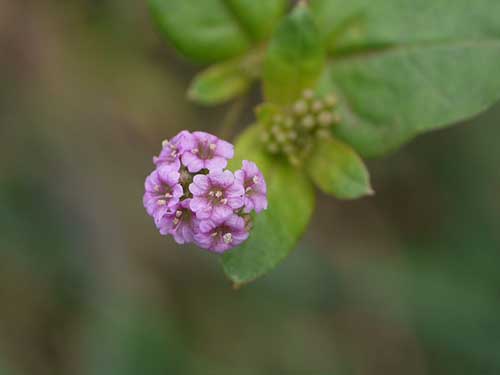
Boerhaavia diffusa contains numerous bioactive compounds which are proven to have health benefits. The plant even has some new compounds which are not found in other plants.
Some of these compounds include:
- Alkaloids (particularly punarnavine)
- Rotenoids
- Flavonoids
- Gycosides
- Phenolics
- Quercetin
- Caffeoyltartaric acid
- Lignans
- Xanthones
These compounds have been extensively researched. A Google Scholar search shows many studies showing health benefits of Boerhaavia diffusa.
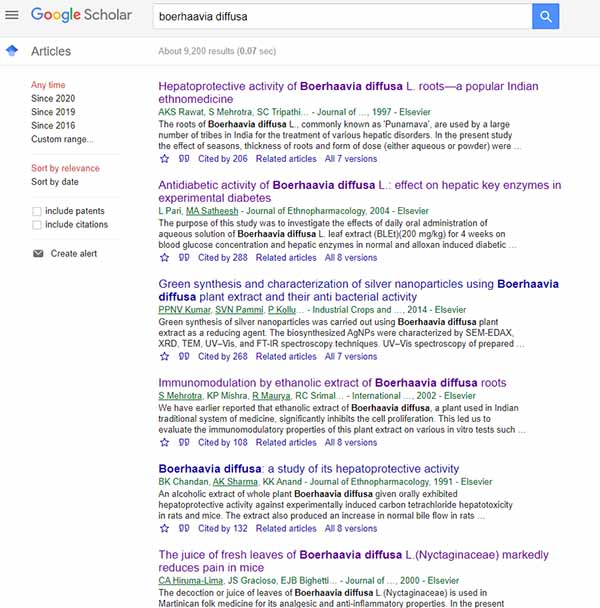
Below are some of the main health benefits associated with Boerhaavia diffusa.
1. Anti-Inflammatory
One of the key benefits of punarnava is that is reduces inflammation. Numerous studies found that compounds from the leaves and roots of the plant inhibit chemicals which cause inflammation. Some of these compounds are quercetin, kaempferol, liriodendrin, and punarnavine. (2)
2. Gastro Intestinal Problems
Punarnava can help with GI problems like ulcers, IBS and SIBO by reducing inflammation in the gut. It also helps heal ulcers, improve stomach mucus, and regulate gastric secretions.
3. Anti-Microbial
Even compared to other anti-microbial plants, punarnava has strong antibacterial, anti-fungal and anti-viral benefits. Studies showed that the plant reduced levels of E. coli, Staphylococcus aureus, Pseudomonas aeruginosa, candida, and viruses. All parts of the plant have anti-microbial benefits but the root has the strongest benefits. (3, 4)
4. Liver Health
Punarnava is often used as an Ayurveda remedy for liver problems. Studies show that flavonoids in the plant can help heal liver issues. It also helps improve bile flow. (5)
5. Antioxidants
There are many potent antioxidants in punarnava. These antioxidants are linked to many health benefits, such as:
- Protecting against heart disease
- Anti-diabetic
- Reducing cholesterol
- Improving muscle glucose uptake
- Better immunity
- Reducing stress
- Healing wounds (6, 7, 8)
6. Cancer
Many studies have looked at the benefits of Boerhaavia diffusa in fighting cancer. It appears that the compound purnavarine in the plant has strong anti-cancer effects which can prevent cancer cells from proliferating. (9, 10)
7. Convulsions
Punarnava has long been used as a remedy for convulsions (epilepsy). It works by helping regulate the calcium channels.
8. Enlarged Prostate
Compounds in punarnava help relax smooth muscle tissue in the prostate, reduce inflammation, and keep cell growth under control. This significantly helps men with enlarged prostate and alleviates urinary problems. (11, 12)
How to Use Punarnava
If you can find or grow punarnava, then you can simply eat the plant leaves raw. They are a good source of nutrition and have a very fresh, mild taste compared to other greens. In India, it’s common for people to cook the leaves but this may destroy many of the natural compounds in them.
For health benefits, it’s better to consume punarnava root. This is where the most helpful compounds are concentrated. You can dig them up yourself, dehydrate them, and grind them into a powder. Or simply buy punarnava powder online.
Punarnava powder does have an earthy, slightly bitter taste. I find it goes best in smoothies with strong-flavors, such as cherries or blackberries.
Punarnava Powder Dosage
The standard recommended dosage of punarnava root powder is usually 3 grams, taken one or two times daily. Consult with your healthcare provider.
Cautions
It’s worth noting that punarnava is a slight laxative. You might want to start by taking just a small dosage of the powder. See how your body reacts and then increase to the recommended dosage.
Image credits: “Punarnava” (CC BY-NC 2.0) by jayeshgp912,
“Punar-nava (Telugu: పునర్న�” (CC BY-SA 2.0) by Dinesh Valke
“Satodi (Gujarati: સાતૉડી)” (CC BY-SA 2.0) by Dinesh Valke.

